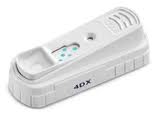SNAP® 4Dx®: What do all those blue dots mean?

By Andrew Haertel, Dane County Humane Society 4th year Veterinary Student Extern
These tests aid in the diagnosis of four diseases in dogs: heartworm, canine monocytic ehrlichiosis, Lyme disease, and anaplasmosis. The SNAP®4Dx® test and SNAP®4Dx® Plus tests will both show positive heartworm results if an adult female heartworm is present in the body. In addition, these tests are also looking for antibody responses to tick-borne bacterial diseases. Antibodies are an important part of the body’s natural defense system, and the immune system tailors a unique set of antibodies for each body invader.
What are the tick-borne diseases diagnosed by the SNAP®4Dx®/SNAP®4Dx® Plus tests?
The SNAP®4Dx® test identifies antibodies to Ehrlichia canis, Borrelia burgdorferi, and Anaplasma phagocytophilum. The SNAP®4Dx® Plus test identifies antibodies to these three diseases and additionally identifies antibodies to Ehrlichia ewingii and Anaplasma platys.
Canine monocytic ehrlichiosis is a caused by Ehrlichia canis which is transmitted to dogs by bites from the brown dog tick. Ehrlichiosis can cause bone marrow suppression, decreased blood cells, decreased platelets, and hemorrhage. Anaplasma platys is sometimes transmitted by the same bite from brown dog ticks transmitting Ehrlichia canis; however, symptoms of Anaplasma platys are usually minimal.
Lyme disease is caused by Borrelia burgdorferi which is transmitted to dogs by bites from the deer tick, primarily in the Midwest. With this disease, dogs may develop fever, arthritis, protein-losing nephropathy, cardiac disease, or neurological abnormalities.
Anaplasma phagocytophilum is transmitted to dogs by bites from the brown dog tick. Dogs may develop fever, lethargy, arthritis, neurological abnormalities, decreased platelets, and mild anemia. Ehrlichia ewingii causes disease very similar to this organism, but it is transmitted to dogs by the lone-star tick.
When are SNAP®4Dx® tests needed?
Any dog with fever, inappetence, lethargy, unexplained lameness in multiple limbs, vasculitis, certain kidney problems, or blood clotting abnormalities should be tested for tick-borne disease such as those found on the SNAP®4Dx® tests. However, many veterinarians also monitor healthy dogs with yearly surveillance testing to assess a dog’s risk of tick exposure, particularly in areas where these diseases are common.
How do I know when to treat these diseases?
Veterinarians make a diagnosis after understanding clinical signs, positive antibody tests, and responses to treatment. A positive SNAP®4Dx® test result alone is not an indisputable reason to treat a healthy dog. Serological tests such as these SNAP tests are used to document exposure. They do not prove a cause of illness. Some dogs exposed to Ehrlichia species, Anaplasma species, and Borrelia burgdorferi may never become ill. In some Lyme disease areas, 70–90% of normal dogs are Lyme-positive and treating all those dogs is not warranted. In areas where Ehrlichia canis is common, many healthy dogs have positive antibody test results. If a dog’s immune system is quick enough, an animal may produce antibodies to fight infection without an animal actually becoming sick. In these subclinical or asymptomatic cases, the SNAP®4Dx® tests will still show positive results. Positive test results and antibodies may last for months or years following infection and treatment or be present before animals develop clinical signs.
Overtreating dogs has negative effects. Antibiotics used to treat these tick-borne diseases may cause anorexia, esophagitis, esophageal stricture, and bacterial resistance in the environment as side effects.
The treatment of positive healthy dogs is controversial at this time. If an owner or shelter has resources, healthy dogs testing positive on the SNAP®4Dx® tests for tick-borne illnesses can have a diagnosis ruled-out or ruled unlikely with additional diagnostic tests determined by a veterinarian. Treatment is recommended for positive Borrelia burgdorferi on the SNAP®4Dx® test if a dog has consistent clinical signs and proteinuria. Treatment is recommended for positive Anaplasma or Ehrlichia species results on the SNAP®4Dx® test of a symptomatic dog if consistent blood cell or serum protein abnormalities concurrently exist.
Will the antibody tests like SNAP®4Dx® become negative following treatment?
Test results will remain positive for weeks, months, or years. Antibodies remain in circulating in the body long after an infection is cleared with or without antibiotics.
What should I do about multiple positive results?
It's not unusual to see ticks carry more than one of these agents. If there are any consistent clinical signs or blood profile changes determined by a veterinarian, the standard treatment, Doxycycline, is effective against all of them.
Are these diseases contagious?
Tick-borne illnesses are transmitted by bites from ticks; these illnesses cannot be passed directly from dog to human or dog to dog. Infected dogs should be thoroughly checked for ticks over their entire body to avoid any ticks from feeding on further hosts. Blood transfusion transmission is possible dog to dog. Dogs with antibodies to any of these diseases are typically not used for blood transfusion programs as a consequence.
What should potential adopters do?
Adopters and potential adopters should be told about these test results and should be encouraged to discuss the results and medical history with their own veterinarian, preferably prior to adoption. Because of controversy surrounding when to treat asymptomatic animals, veterinarians and owners must balance their animal’s care plan with safety of treatment and risk of disease.
Images below represent the antibody test results for the different organisms included in the SNAP®4Dx® test.
These tests aid in the diagnosis of four diseases in dogs: heartworm, canine monocytic ehrlichiosis, Lyme disease, and anaplasmosis. The SNAP®4Dx® test and SNAP®4Dx® Plus tests will both show positive heartworm results if an adult female heartworm is present in the body. In addition, these tests are also looking for antibody responses to tick-borne bacterial diseases. Antibodies are an important part of the body’s natural defense system, and the immune system tailors a unique set of antibodies for each body invader.
What are the tick-borne diseases diagnosed by the SNAP®4Dx®/SNAP®4Dx® Plus tests?
The SNAP®4Dx® test identifies antibodies to Ehrlichia canis, Borrelia burgdorferi, and Anaplasma phagocytophilum. The SNAP®4Dx® Plus test identifies antibodies to these three diseases and additionally identifies antibodies to Ehrlichia ewingii and Anaplasma platys.
Canine monocytic ehrlichiosis is a caused by Ehrlichia canis which is transmitted to dogs by bites from the brown dog tick. Ehrlichiosis can cause bone marrow suppression, decreased blood cells, decreased platelets, and hemorrhage. Anaplasma platys is sometimes transmitted by the same bite from brown dog ticks transmitting Ehrlichia canis; however, symptoms of Anaplasma platys are usually minimal.
Lyme disease is caused by Borrelia burgdorferi which is transmitted to dogs by bites from the deer tick, primarily in the Midwest. With this disease, dogs may develop fever, arthritis, protein-losing nephropathy, cardiac disease, or neurological abnormalities.
Anaplasma phagocytophilum is transmitted to dogs by bites from the brown dog tick. Dogs may develop fever, lethargy, arthritis, neurological abnormalities, decreased platelets, and mild anemia. Ehrlichia ewingii causes disease very similar to this organism, but it is transmitted to dogs by the lone-star tick.
When are SNAP®4Dx® tests needed?
Any dog with fever, inappetence, lethargy, unexplained lameness in multiple limbs, vasculitis, certain kidney problems, or blood clotting abnormalities should be tested for tick-borne disease such as those found on the SNAP®4Dx® tests. However, many veterinarians also monitor healthy dogs with yearly surveillance testing to assess a dog’s risk of tick exposure, particularly in areas where these diseases are common.
How do I know when to treat these diseases?
Veterinarians make a diagnosis after understanding clinical signs, positive antibody tests, and responses to treatment. A positive SNAP®4Dx® test result alone is not an indisputable reason to treat a healthy dog. Serological tests such as these SNAP tests are used to document exposure. They do not prove a cause of illness. Some dogs exposed to Ehrlichia species, Anaplasma species, and Borrelia burgdorferi may never become ill. In some Lyme disease areas, 70–90% of normal dogs are Lyme-positive and treating all those dogs is not warranted. In areas where Ehrlichia canis is common, many healthy dogs have positive antibody test results. If a dog’s immune system is quick enough, an animal may produce antibodies to fight infection without an animal actually becoming sick. In these subclinical or asymptomatic cases, the SNAP®4Dx® tests will still show positive results. Positive test results and antibodies may last for months or years following infection and treatment or be present before animals develop clinical signs.
Overtreating dogs has negative effects. Antibiotics used to treat these tick-borne diseases may cause anorexia, esophagitis, esophageal stricture, and bacterial resistance in the environment as side effects.
The treatment of positive healthy dogs is controversial at this time. If an owner or shelter has resources, healthy dogs testing positive on the SNAP®4Dx® tests for tick-borne illnesses can have a diagnosis ruled-out or ruled unlikely with additional diagnostic tests determined by a veterinarian. Treatment is recommended for positive Borrelia burgdorferi on the SNAP®4Dx® test if a dog has consistent clinical signs and proteinuria. Treatment is recommended for positive Anaplasma or Ehrlichia species results on the SNAP®4Dx® test of a symptomatic dog if consistent blood cell or serum protein abnormalities concurrently exist.
Will the antibody tests like SNAP®4Dx® become negative following treatment?
Test results will remain positive for weeks, months, or years. Antibodies remain in circulating in the body long after an infection is cleared with or without antibiotics.
What should I do about multiple positive results?
It's not unusual to see ticks carry more than one of these agents. If there are any consistent clinical signs or blood profile changes determined by a veterinarian, the standard treatment, Doxycycline, is effective against all of them.
Are these diseases contagious?
Tick-borne illnesses are transmitted by bites from ticks; these illnesses cannot be passed directly from dog to human or dog to dog. Infected dogs should be thoroughly checked for ticks over their entire body to avoid any ticks from feeding on further hosts. Blood transfusion transmission is possible dog to dog. Dogs with antibodies to any of these diseases are typically not used for blood transfusion programs as a consequence.
What should potential adopters do?
Adopters and potential adopters should be told about these test results and should be encouraged to discuss the results and medical history with their own veterinarian, preferably prior to adoption. Because of controversy surrounding when to treat asymptomatic animals, veterinarians and owners must balance their animal’s care plan with safety of treatment and risk of disease.
Images below represent the antibody test results for the different organisms included in the SNAP®4Dx® test.

